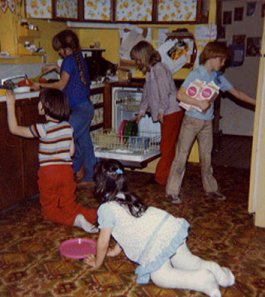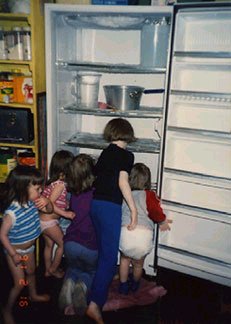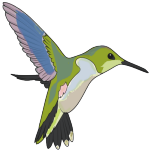Building A Child's Self Esteem
Building a special needs child's self esteem is very important when a child has a disability such as cerebral palsy. The best way to do this is to make the child feel needed.
I am the single mother of twenty-six. I have built my family mostly through adoption. Most of my children who have disabilities, are very active and capable children. Over the years, I have put much thought into trying to raise each one just as though they were just like anyone else. I don't see my children's handicaps when I look at them. To me, they are simply children. Children with strengths and weaknesses like everyone else. I want each one to be aware of all their strengths first, and thus, not to feel badly about their weaknesses, or worse, try to use them to get out of things! Every living person has weaknesses, I tell them. The things you can't do are not as important as the things you CAN do!
A disabled child's self identity, and feeling about himself can be very fragile. He will be disinclined to try to progress, if he believes himself to be incapable, a failure, or unimportant. Particularly vulnerable to this is the child who has experienced being in the foster care system. This child feels worse than useless. He has also been unwanted, maybe by numerous families, and knew it. Being in the foster care system, he has never learned how to be helpful. He comes to his adoptive family bringing virtually nothing. No happy feeling about himself inside. He is a human child who feels miserably like a non-person.
Building a child's self esteem is very important. The best way to do this is to make the child feel needed.
 Even corrective casting did not stop Skyla from joining the dishes crew!
Even corrective casting did not stop Skyla from joining the dishes crew!
What makes a child want to help? The same inspiration as anyone else - being appreciated! A child with cerebral palsy, who has intelligence enough to want to join his or her siblings in their play, is able to learn to help. I searched my brain year after year, to find tiny things such a child could do, to feel needed. A child, with a weak body, but a willing heart can do many of the following things:
1. Put away small cans, or light dishes, on a shelf the child can reach.
2. Carry something from one part of the house to another in their wheelchair.
3. Shake a bag with chicken and shake 'n bake.
4. Pour salad dressing on a salad.
5. Sprinkle candies on cookies someone is baking.
6. Stir the stew with a long wooden spoon.
7. Come to tell the parent if a certain child gets out of bed.
8. Tell a parent if the coffee is ready.
9. Tell someone the kitchen timer has gone off, etc.
10. Drive around the house telling everyone that dinner is ready.
11. Smooth their own quilt on their bed.
12. Turn on, or off, a light, a tape deck, a TV, or any number of things.
Lamps can be bought that turn on and off with the touch of a finger.
13. Cover up a sleeping sibling whose quilt has fallen off. (Only a child
who won't wake a sleeping sibling!)
14. Watch over a pot until it boils. (Only a child who is safe around
boiling water.)
15. Possibly open curtains, with an object fastened to the end of the
cord for grasping.
16. Help load or unload the dishwasher.
17. One job everyone loves, is pulling frozen food out of the freezer
onto the tray of a child's wheelchair, so I can defrost.
 Defrosting the freezer is always great fun!
Defrosting the freezer is always great fun!
Of the twenty-one children who are still living at home, sixteen are able to help.
Usually my children's first job in life is picking up their own toys. From there, I teach them to put away their own clothes. Almost any child who is able to open and close a drawer, can learn this skill. If they can't open and close drawers, I get wide, sturdy shelves for them.
My daughter Cherise has severe Cerebral Palsy, (spastic quadriplegia) and normal intelligence. She is very careful and responsible. She gives her younger siblings rides around the house on their power chair. She holds them in her lap, lets them sit on her footrest, and lets them stand behind, hanging on to the handles. I remember several of my babies that their big sister Cherise helped me comfort when they were fussy. I would put the baby in an infant backpack, and fasten it to the back of her power chair. All she had to do was move around the house like she normally did, and the baby would be happy. This was a true and valuable help to me, and delighted Cherise beyond words! Cherise is helpful carrying things from one part of our huge house, on her wheelchair, to another. All of Cherise's help is done from her power chair, as she is unable to move around the house on her own.
My son Tony has severe Cerebral Palsy, (spastic/athetoid diplegia) and poor vision, and is most stable on the floor. He prefers the floor to his power chair, as he can reach things better, and move around more. Tony makes good and positive use of the intelligence God gave him, though he has moderate mental retardation. Tony has a very sweet and helpful personality. He thinks about others, and has a helpful spirit. He sweetly and patiently picks up toys, and the numerous things that end up on the floor on any given day. He remains the winner as my best floor picker-upper! For Tony, dressing himself is a chore. But he can do it, for the most part, and though it takes him a long time, he knows that it a piece of independence he can accomplish, and is a true help.
My son Chad has Cerebral Palsy, (spastic hemiplegia) and severe mental retardation. He only can use one hand, and walks unsteadily. Chad can set the table (non-breakable items, as he falls easily), make his bed, and clean his room. He can vacuum his own room with some success in places. He can load and unload the dishwasher, though unevenly, load and unload the washing machine and dryer, with someone watching that he doesn't over-fill them; and sort clothing into bins for their respective owners, as well. I must admit that he has broken the door off the dryer many times, by falling on it, and he has been known to break a washer by stuffing it too full. But all the help he has given, and his independence and feeling of success far outweighs the damages.
My adult daughter Priscilla has severe Cerebral Palsy (spastic quadriplegia) from being hit by a car when she was nine. She has normal intelligence. Her body and hands are very weak. But she was a meticulous and accurate sock sorter before she grew up and moved away. Believe me, a family can always use a good sock sorter! In our family, it's a huge job, too, and few had the patience to do it. Thank you again, Priscilla!
My daughter Skyla has Spina Bifida (partially paralyzed from the waist down) but she is very strong, nimble and quick, with a cheerful and brave spirit. She has normal intelligence. It is very difficult for her to get things out of the dryer, without breaking the door off. But she has found a way to do almost everything else. She can pull herself up onto the kitchen counter to get something out of a high cupboard, or put it away. Skyla is a capable, quick, and willing daughter, extremely helpful with her younger siblings. When they were tiny, she was an expert diaper changer, a patient toddler-dresser, a loving rocking-chair comforter, a tender band-aid putter-onner. Skyla has an abundance of energy, and the sweet spirit of helping others with it.
Some jobs can be successfully accomplished with two or three working together. Unloading the freezer can be done so very quickly using the group approach! Any number of children can take frozen food out of the freezer and put it on Cherise's tray. When her tray is full, she can drive it to the other side of the room, and push them all off onto a blanket on the floor. When the food is out, we wrap it all up in that blanket, and set about defrosting.
Putting away clothes is a job that works well with a group approach. I sort clothes fresh out of the dryer, into baskets. Each basket has a name on it. When it's time, Cherise carries one basket at a time, to its appropriate bedroom, and the child whose clothes they are, puts them away. Then Cherise comes back, and carries the empty basket back to me. If someone isn't there, or doesn't want to put them away, she comes to tell me. I go to see what the problem is. This doesn't happen too often. Cherise saves me a lot of walking, as our house has eighteen bedrooms.
Skyla saves me tons of time, doing wheelies in her chair around the house, changing diapers, putting away clothes, you name it, she does it. And her bubbly, cheerful attitude is a tremendous blessing! She is the only one who is able to go to the store for me at this time, unless her grown siblings are home. The store is a block away, and she can be there and back in just a few minutes. She also goes to the bank for me. She gets good exercise, and also enjoys this very much!
Tony is good at handing me clothes out of the basket on the floor by the washer. His face just lights up when he hands me each handful, because he knows he is helping. It would be so much faster if I did it alone, but then how would I help that feeling bloom inside my son, that he is a capable and needed member of his family! He is gentle and passive, and would just sit and smile all the day long, if I didn't encourage him to join in. But I want him to grow up and have the spirit of helping, so that he can possibly have some kind of a job, even if it's a sheltered workshop, and maybe he won't become bored or unhappy. Maybe he'll keep that sweet smile, and his own ethics will let him know he is doing something important, no matter how small.
It sometimes takes considerable patience for me to wait for chores to be done. But it is important to the child's self esteem. A parent could do these things in a flash, and never give it a thought. But even a child who is very weak, and can move only with effort, needs to be needed. A good way to tell if a little one is ready to start helping, is if he or she is beginning to try to play alongside another child. The beginning of desire for playing with other children, though not ready for much interaction yet, is a social developmental point that comes at roughly the same time as the ability to cooperate in helping, when taught how.
A parent needs to use creativity to discover things a weak child can do. It is a wonderful thing when a child can know he or she is needed, and appreciated, like everyone else. Then, within each child, is set the cornerstone for a happy and confident future success!
